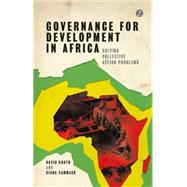Drawing on in-depth empirical research spanning a number of countries in Africa, Booth and McCormick's path-breaking book offers both an accessible overview of issues surrounding governance for development on the continent, whilst also offering a bold new alternative. In doing so, they controversially argue that externally imposed 'good governance' approaches make unrealistic assumptions about the choices leaders and officials are, in practice, able to make. As a result, reform initiatives and assistance programmes supported by donors regularly fail, while ignoring the potential for addressing the causes rather than the symptoms of this situation. In reality, the authors show, anti-developmental behaviours stem from unresolved - yet in principle soluble - 'collective-action problems'.
Governance for Development in Africa offers a comprehensive and critical examination of the institutional barriers to economic and social progress in Africa, and makes a compelling plea for fresh policy thinking and new ways of envisioning so-called 'good governance'.
Governance for Development in Africa offers a comprehensive and critical examination of the institutional barriers to economic and social progress in Africa, and makes a compelling plea for fresh policy thinking and new ways of envisioning so-called 'good governance'.








